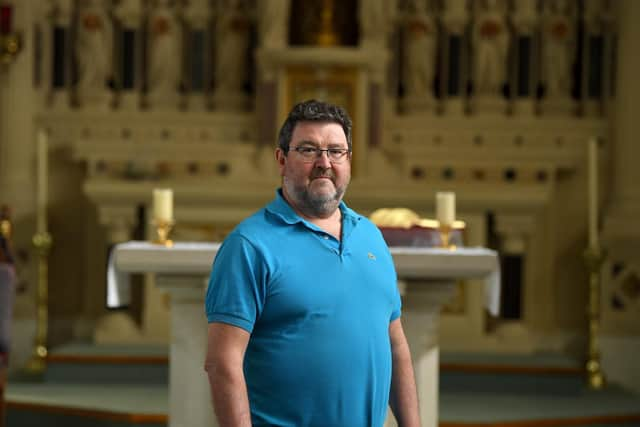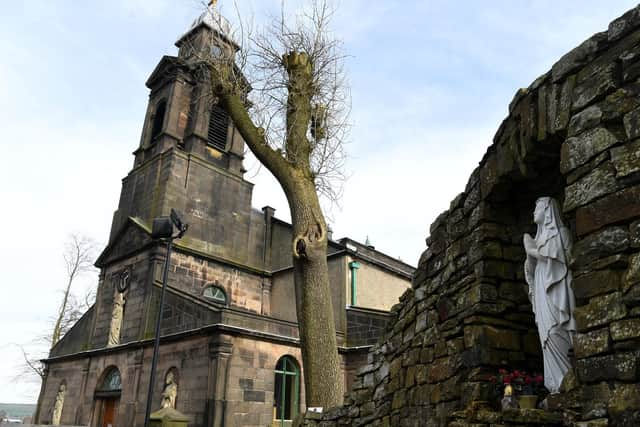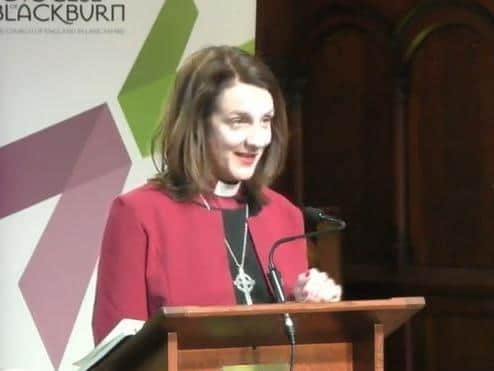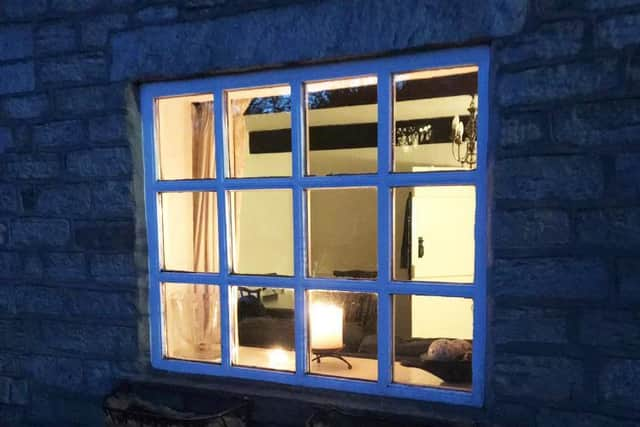How Lancashire's religious communities worshipped via webcam because of coronavirus
and live on Freeview channel 276
The restrictions have seen various faiths turning to technology in an attempt to ensure that people can still witness the services that they would otherwise have been attending in person.
Catholics in Lancashire have been told that their parish priests will continue to celebrate Mass in the absence of a congregation – but some of them are also webcasting it for a wider audience.
Advertisement
Hide AdAdvertisement
Hide Ad“It’s been a Godsend,” said Fr. Graeme Dunne of the equipment he invested in last year to cater for the increasing number of housebound parishioners in his parish of St. Gregory's in Chorley.


With the church, on Weldbank, closed last weekend, there was a seven-fold increase in viewers of the webcast - 300 were registered on Saturday evening alone. While that enabled worshippers to take part in most aspects of the weekend Masses, the most striking for Fr. Dunne was that he was unable to hear their participation.
“There was nothing for me to focus on – I would usually look up and see people’s faces, but instead there was just a camera.
“Every time I said something which the congregation would respond to, there was silence. But because I wasn’t getting that response, it did cause me to slow down a little.
Advertisement
Hide AdAdvertisement
Hide Ad“So while it was an odd experience, it was also a very moving one,” Fr. Dunne explained.


His is one of several parishes in the Archdiocese of Liverpool – which covers Chorley and South Ribble – to offer webcast Masses. The Metropolitan Cathedral in Liverpool in providing the same facility for those whose parish does not have the necessary equipment.
As well as broadening his catchment area – he had viewers in Japan and New Zealand at the weekend – Fr. Dunne says there is already evidence of people tuning in who may not have walked through the doors of a physical church in years.
“When people are in this kind of situation – and they know they haven’t got the answers themselves – they might be more open to reflection and to reflecting on God.”
Advertisement
Hide AdAdvertisement
Hide AdOn the Preston side of the Ribble and across the rest of the county, the Diocese of Lancaster is also trying to keep in contact with Mass-goers who are locked out of their churches for the time being.


St. Peter’s Cathedral in Lancaster does not have the broadband capability to webcast its services, but the diocese is recording Masses and uploading them to You Tube for viewing later. With Easter approaching in less than a month, the services for Holy Week – the most significant point in the church’s calendar – will also be shared on the platform.
A number of individual parishes are webcasting live – including St. Clare’s in Preston and St. Kentigern’s in Blackpool – and a diocesan Instagram account is being used to provide images for reflection, such as Stations of the Cross.
The Church of England in Lancashire also webcast a service from St. James’ Church in Clitheroe on Sunday morning. It was led by the Rt Rev. Dr. Jill Duff, Bishop of Lancaster, who described the experience of preaching to largely empty pews as “surreal”.
Advertisement
Hide AdAdvertisement
Hide Ad“But it was also beautifully spiritual in many ways. Jesus appeared to the disciples when they were locked away behind closed doors and gave them courage – and it felt a bit like that,” explained Bishop Duff.


She said that she was particularly moved by how many people had taken part in a National Day of Prayer, which saw them simultaneously lighting a candle in their homes on Sunday evening to pray that the virus be stopped.
“There are lots of inspiring stories about previous National Days of Prayer – 100 days after George V called one in 1918, the Armistice was signed to mark the end of World War One.
“When George VI called one in 1940 as troops were being bombed into the English Channel, a wind blew up, followed by a strange calm - and that allowed 335,000 troops to be rescued from the beaches in the famous evacuation. It became known as the Miracle of Dunkirk."
Advertisement
Hide AdAdvertisement
Hide AdIn future weeks, Blackburn Cathedral will be webcasting its 9am Sunday service and midweek Evensong via Facebook - along with forthcoming Holy Week services - and is also intending to upload them to You Tube.
Meanwhile, the Muslim community is being reminded that they do not have to come together in order to pray during these tumultuous times.
“You can pray the Quran by yourself - it might even help you to better reflect on what your God is telling you,” said Abdul Hamid Qureshi, CEO of the Lancashire Council of Mosques.
He said that some initial reluctance to the idea of closing mosques had now been overcome and that he was proud that the Burnley and Pendle areas were the first to take the unanimous decision to shut the doors on their places of worship.
Advertisement
Hide AdAdvertisement
Hide Ad“Some people have a tendency to say that everything comes from God, so it’s no problem [to continue praying together] – but that is a very shallow understanding of things.
“Nurses and doctors could lose their lives for us – if we can’t understand that, then there is a problem with our thinking.
“So in all aspects of our life, we must co-operate with what the government is telling us to do.”
Mr. Qureshi said that some mosques were making use of the low-powered radio systems used to issue the call to prayer in order to broadcast Friday prayers to Muslims in their own homes - but he acknowledged that it would be upsetting for congregations to be unable to join together for services during Ramadan, which begins in exactly a month.
Advertisement
Hide AdAdvertisement
Hide AdThe Jewish community in St. Annes has also embraced the option of digital devotion while they are confined to their homes – with many more tuning in from across Lancashire and around the world.
Rabbi Danny Bergson of the Shul by the Sea Hebrew Community said that partaking in a webcast of the Friday evening Kabbalat Shabbat service had moved him to tears.
“We have a lot of older members of the community who may not be used to this kind of technology, but they have absolutely jumped right into it.
“I was nearly crying when I saw how many people were taking part.
“The important thing now is that we pray for the whole of humanity – because the whole of humanity is affected by this virus,” Rabbi Bergson added.